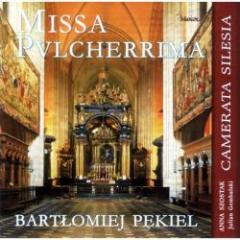Bartlomiej Pekiel - Missa Pulcherrima (2006)
Bartłomiej Pękiel - Missa Pulcherrima (2006)

Missa Pulcherrima 1. Kyrie, 4:34 2. Gloria, 6:02 3. Credo, 10:07 4. Sanctus, 2:59 5. Benedictus, 2:17 6. Agnus Dei, 4:06 TT: 30:10 I Missa Senza Le Cerimonie 7. Kyrie, 1:01 8. Gloria, 1:23 9. Credo, 2:44 10. Sanctus, Benedictus, 2:48 11. Agnus Dei, 2:18 TT: 10:20 II Missa Senza Le Cerimonie 12. Kyrie, 1:12 13. Gloria, 1:54 14. Credo, 3:57 15. Sanctus, 2:00 16. Benedictus, 1:36 17. Agnus Dei, 1:29 TT: 12:12 18. Magnum Nomen Domini, 1:36 19. Resonet In Laudibus, 1:32 Julian Gembalski – positive organ Camerata Silesia Anna Szostak – conductor
According to Johann Mattheson, Polish composer Bartlomiej Pekiel was born German, but his known career played itself out in Poland in its entirety. Earliest mention of Pekiel comes from 1633 when he enters the service of the Warsaw-based court of King Wladyslaw IV Vasa, as a sacred musician working with Marco Scacchi, a composer who supplied the King's court with opera and other kinds of secular music. Pekiel also took over the other duties when Scacchi returned to Italy owing to health concerns in 1649, but was not elevated to sole music director until 1653. Pekiel would not enjoy the position long, as in 1655 the Swedes swept Wladyslaw IV Vasa's successor, King John II Casimir, off the throne in the conflict now known as "The Deluge." Pekiel managed to land on his feet in Krakow, as in 1658 he was named to the post of kapellmeister at Wawel Cathedral. While direct evidence of his death has not been substantiated, Pekiel must have died around 1670, as his successor is named in cathedral records around that time.
Bartlomiej Pekiel was the foremost Polish composer of his day, and though his work belongs historically to the middle Baroque, stylistically it is a holdover from the Italian renaissance of the previous century. So technically assured is Pekiel within this style that a tour of study in Italy is likely, even though he is not known to have traveled there; perhaps it occurred before first mention of him is found in 1633, and it is also possible that Pekiel was a little older than his suggested birthdate of "ca. 1610" might convey. Whereas his Polish contemporaries are known by mere handfuls of pieces, Pekiel is represented to posterity through 14 settings of the mass, 17 motets, and about 42 instrumental pieces, though the authenticity of the latter has been a matter of debate. A scholarly edition of Pekiel's work was published in 1996 by Monumenta Musicae in Polonia, though certain works -- such as the Missa pulcherrima ad instar Praenestini -- have been available in modern editions going back into the 1930s. --- Uncle Dave Lewis, Rovi
Kompozytor i organista. Data i miejsce jego urodzenia, ani pochodzenie nie są znane, zmarł ok. 1670. Pierwsze wiadomości o Pękielu łączą się z jego działalnością na dworze króla Władysława IV w Warszawie, gdzie przebywał na pewno w latach 1637-54, a być może nawet od 1633. (Zmienna i zróżnicowana pisownia nazwiska, jaka występuje w manuskryptach utworów przechowywanych w zbiorach wawelskich - Pekel, Peckel, Pekell - skłania muzykologów do podejmowania rozważań na temat możliwości jego niemieckiego pochodzenia.) W kapeli królewskiej kierowanej przez Marco Scacchiego pełnił początkowo funkcję organisty, a następnie wicekapelmistrza, tworząc i wykonując muzykę religijną oraz zajmując się kształceniem młodych muzyków. Po wyjeździe Scacchiego z Polski w 1649 Pękiel objął funkcję kapelmistrza. Po zajęciu Warszawy przez Szwedów (1655), opuścił stolicę i następne 3 lata przypuszczalnie spędził na tułaczce wraz z dworem królowej.
Od 1658 do 1664 był kapelmistrzem kapeli katedralnej na Wawelu w Krakowie. Zmarł ok. 1670. Za życia Pękiela ukazał się w druku tylko jeden jego utwór - potrójny kanon 6-głosowy, wydany w Xenia Apollinea, dodatku nutowym do Cribrum musicum ad triticum Siferticum Marco Scacchiego (Wenecja 1643). Pozostałe utwory znalazły się w rękopiśmiennych kopiach, spisanych przez skryptorów obcego i polskiego pochodzenia (m.in. rorantystę ks. Macieja Arnulfa Miśkiewicza, który jedną z mszy Pękiela uznał za najpiękniejszą i nazwał ją Missa pulcherrima).
Dzieła wokalno-instrumentalne, przeznaczone na zróżnicowaną obsadę, odznaczają się znacznym bogactwem środków fakturalno-wykonawczych, mogły więc powstać w okresie działalności w Warszawie, choć nie jest wykluczone, że tworzyły repertuar kierowanej przez Pękiela wokalno-instrumentalnej kapeli katedralnej na Wawelu. Utwory wokalne natomiast, przeważnie o 4-głosowej obsadzie, charakterystyczne dla repertuaru Kapeli Rorantystów, przypuszczalnie skomponowane zostały w czasie działalności kompozytora na Wawelu i w środowisku wawelskim były wykonywane. ---Małgorzata Kosińska, culture.pl
download: uploaded anonfiles yandex 4shared solidfiles mediafire mega filecloudio








